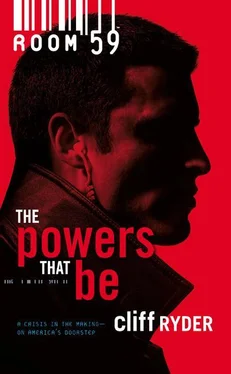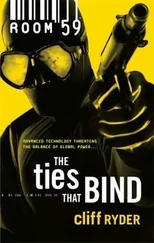Cliff Ryder - The Powers That Be
Здесь есть возможность читать онлайн «Cliff Ryder - The Powers That Be» — ознакомительный отрывок электронной книги совершенно бесплатно, а после прочтения отрывка купить полную версию. В некоторых случаях можно слушать аудио, скачать через торрент в формате fb2 и присутствует краткое содержание. Жанр: Триллер, Шпионский детектив, на английском языке. Описание произведения, (предисловие) а так же отзывы посетителей доступны на портале библиотеки ЛибКат.
- Название:The Powers That Be
- Автор:
- Жанр:
- Год:неизвестен
- ISBN:нет данных
- Рейтинг книги:3 / 5. Голосов: 1
-
Избранное:Добавить в избранное
- Отзывы:
-
Ваша оценка:
- 60
- 1
- 2
- 3
- 4
- 5
The Powers That Be: краткое содержание, описание и аннотация
Предлагаем к чтению аннотацию, описание, краткое содержание или предисловие (зависит от того, что написал сам автор книги «The Powers That Be»). Если вы не нашли необходимую информацию о книге — напишите в комментариях, мы постараемся отыскать её.
The Powers That Be — читать онлайн ознакомительный отрывок
Ниже представлен текст книги, разбитый по страницам. Система сохранения места последней прочитанной страницы, позволяет с удобством читать онлайн бесплатно книгу «The Powers That Be», без необходимости каждый раз заново искать на чём Вы остановились. Поставьте закладку, и сможете в любой момент перейти на страницу, на которой закончили чтение.
Интервал:
Закладка:
With an effort, he put his feelings aside and got back to the problem at hand. All right, back to business. I’ve got four million possibilities in a city with no phone books. I’ve been in worse spots. He racked his brain, trying to figure a way in. Cuba didn’t have any corner Internet cafés he could just stroll into. Something Kate had mentioned in the briefing clamored for his attention, an off-the-cuff remark about the military becoming more involved in Cuban businesses.
That’s how to find him, he thought.
Marcus hailed a small three-wheeled cab and told the driver, “Hotel Saratoga, please.”
The cabdriver looked at him strangely, but Marcus nodded and discreetly held up a palmful of pesos. The cab took off so quickly it rose up on its two back wheels, and Marcus had to brace himself in the back to keep from falling over.
Fifteen minutes later, he stood across the street from one of Havana’s recent success stories. According to his information, the Saratoga dated from the late nineteenth century, but had closed by the time of the revolution and was left to rot for a half century. Recently restored with modern amenities, it was now one of the city’s top destinations. On the western edge of the historical center, it afforded a fantastic view of the Capitolio Nacional, Cuba’s version of a capitol building, which looked remarkably like a certain white marble domed building in Washington, D.C.
Looking at the eight-story building’s elegant, neoclassi-cal facade, Marcus was reminded even more of the crumbling neighborhoods he had passed, only several blocks away, on the way over. He knew that it was the same in cities all over the world, yet the disparity kept gnawing at him. At least I now know firsthand why my parents left. They certainly didn’t want to raise me or my brothers here. But for each one that was able to escape, hundreds, thousands more were stuck, struggling to live every day as best they could.
Just a few yards away, however, a steady flow of well-dressed European, Canadian and even American tourists walked in and out of the Saratoga, either uncaring of the plight of the people, or perhaps just considering it part of the local color. Marcus checked the street for policemen, then casually crossed the road and walked past the front of the hotel, heading around back. As he expected, there was a large, ancient truck unloading crates of vegetables. Marcus edged closer, biding his time until no one was around the back of the flatbed. He walked over, grabbed a crate of let-tuce, hoisted it to his shoulder and entered the hotel kitchen.
The long, large room was frantic with activity as the staff prepared for the evening dinner crowd. Steam rose from several large pots and pans of sizzling vegetables and meats cooked over the open flames of stainless-steel industrial stoves. White-uniformed chefs barked orders at hapless assistants who weren’t doing whatever they were doing fast or well enough.
Marcus walked through the room, looking like just another faceless laborer. He found the walk-in cooler for the vegetables and set his crate down next to the rest of them and headed back out, but instead of turning right, toward the exit, he turned left and headed out of the kitchen, into the ground floor of the hotel.
The corridors were small and cramped, but Marcus slipped past people coming and going, none of whom gave him a second glance. He knew the first rule of infiltration—
look as if you belong, and even more importantly, as if you know exactly where you’re going. He navigated the warren of passageways until he found the way to the front lobby.
He was looking for the manager’s office, who would certainly have a computer attached to their central network. The Saratoga most likely had a business center, but he didn’t want to attract attention by using it and risk drawing unnecessary attention from security.
Although he might have been able to pass himself off as a Spanish tourist, he had Cuban papers, so that story wouldn’t hold up to determined scrutiny. With the high level of tourist apartheid, he couldn’t afford to draw any attention to himself. As strange as it seemed, he decided this was the less risky plan—he just had to wait for the right opportunity.
The manager’s office was near the long front desk on the far side of the bright black-and-white-tiled lobby. The area bustled with people coming, going or just relaxing. Marcus slipped across the room until he found a small table behind a tall potted fern where he could watch the manager’s door.
He had just settled when a dozen Japanese tourists walked through the door and mobbed the front desk. The desk staff began processing their reservations and summoned transla-tion help. Pretending to be engrossed in a tourist magazine, Marcus waited until the manager came out to assist with the line of guests.
Marcus palmed his phone and extended a small metal strip from the bottom. The Saratoga may have recreated old-world charm for its decor, but the security was pure twenty-first century, with key cards needed to access the doors. His phone contained a program that would bypass the security of most card or combination door locks. He stepped around the tall column that formed one corner of the desk, and walked confidently to the manager’s office. Shrouded in shadow, the door was hidden from direct sight of the guests and the staff who assisted them. He slipped the metal prong into the door slot and activated the program. There was a soft click, and Marcus opened the door and slipped inside.
Compared to the opulence of the lobby, the office was spartan, with a plain metal desk, wheeled office chair, metal file cabinet and Marcus’s goal—a fairly new computer next to a laser printer. Marcus circled the desk and set his phone next to the computer, bringing up another program to connect to the hotel’s network. He accessed the computer and began searching for the words “ Mayor,” “Damason” and
“Valdes” in any databases, e-mails or any of the various files across the country. He figured there had to be a listing of officers’ addresses somewhere. The data-miner program would find and download any files with those names. He waited for several tense minutes.
The phone flashed softly twice, signaling it was finished.
Marcus slipped it into his pocket and stood—just as the office door opened.
Framed in the doorway was the manager of the hotel, his mouth dropping open in shock. “Who are you? What are you doing in here?”
“It’s about time you got here. I’ve been waiting for twenty minutes.” Marcus came around the desk and held out his hand. “Jose Prado, with the Ministry of Tourism.”
The words had the desired effect, as the manager took his hand and shook it gingerly. “What is this all about?”
“We’ve had complaints about a group of high-class prostitutes harassing the tourists here. They don’t look like the usual working women, which is why they’ve been getting away with it.” It wasn’t the best cover story, but Marcus needed to draw attention away from what he had been doing at the computer, and he figured the notion of working girls around his hotel would put the manager on the defensive immediately.
“This is the first I’ve heard of it. Our security would have notified me immediately,” the manager said.
Marcus shook his head. “Normally, that is true. However, we suspect that one or more of your employees are also involved.”
The manager’s face darkened and Marcus got the sinking feeling he’d pushed his luck too far. “What? I’ll get to the bottom of this right now. Let’s just get my head of security in here and see what he has to say about this.” Reaching for the phone, the manager glanced at Marcus again, suspicion warring with helpfulness. “Let me see some identification.”
Читать дальшеИнтервал:
Закладка:
Похожие книги на «The Powers That Be»
Представляем Вашему вниманию похожие книги на «The Powers That Be» списком для выбора. Мы отобрали схожую по названию и смыслу литературу в надежде предоставить читателям больше вариантов отыскать новые, интересные, ещё непрочитанные произведения.
Обсуждение, отзывы о книге «The Powers That Be» и просто собственные мнения читателей. Оставьте ваши комментарии, напишите, что Вы думаете о произведении, его смысле или главных героях. Укажите что конкретно понравилось, а что нет, и почему Вы так считаете.











